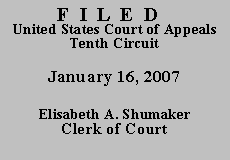

| UNITED STATES OF AMERICA, |
|
| v. | |
| HOMER PRICE,
Defendant-Appellant. |
(D.C. Nos. 05-CV-124-JHP and 02-CR-19-JHP) |
Before HENRY, BRISCOE, and O'BRIEN, Circuit Judges.
I. BACKGROUND
A jury convicted Mr. Price of one count of possession of a firearm and ammunition after former conviction of felony, in violation of 18 U.S.C. §§ 922(g)(1) and 924(c). The district court sentenced Mr. Price to 188 months' imprisonment, plus five years' supervised release. We affirmed Mr. Price's conviction on direct appeal. United States v. Price, 94 Fed. Appx. 792 (10th Cir. 2004).
In his § 2255 motion to vacate, Mr. Price argues five claims: (1) he received ineffective assistance of counsel during his trial and sentencing process because counsel failed to investigate or present mitigating evidence in the form of his medical records, (2) he received ineffective assistance of appellate counsel when counsel failed to argue that Mr. Price's sentencing deprived him of due process or violated his Sixth Amendment rights; (3) he received ineffective assistance of counsel based upon the cumulative effect of alleged trial, sentencing, and appellate errors; (4) his sentence, which the district court increased based upon facts not charged in the indictment that were not presented to a jury, denied him due process of law, and violated his Sixth Amendment constitutional rights; and (5) his sentence violated his Fifth Amendment right to due process. The district court dismissed Mr. Price's ineffective assistance of counsel claims and the challenges to his sentence.
II. DISCUSSION
In order to obtain a COA, Mr. Price must make "a substantial showing of the denial of a constitutional right." 28 U.S.C. § 2253(c)(2). Mr. Price may make this showing "by demonstrating that jurists of reason could disagree with the district court's resolution of his constitutional claims or that jurists could conclude the issues presented were adequate to deserve encouragement to proceed further." Miller-El v. Cockrell, 537 U.S. 322, 327 (2003). "[A] claim can be debatable even though every jurist of reason might agree, after the COA has been granted and the case has received full consideration, that [the] petitioner will not prevail." Id. at 338.
Here, for substantially the same reasons set forth in the district court's order, we conclude that Mr. Price is not entitled to a COA. Mr. Price's ineffective assistance claims satisfy neither the deficient performance nor the prejudice prong set forth in Strickland v. Washington, 466 U.S. 668, 687 (1984). We agree with the district court that, notwithstanding a head injury suffered two years before the alleged offense in this case, none of the medical records Mr. Price submitted indicate he was incompetent to understand the proceedings against him at trial. Furthermore, Mr. Price cannot show prejudice as to his sentence, because he was sentenced at the low end of the sentencing guidelines range. The district court's resolution of this claim is not reasonably debatable.
As to appellate counsel's alleged failure to bring a Blakely/Booker challenge, the district court noted counsel was not ineffective for failure to predict the future outcome of Blakely and raise it on appeal. United States v. Harms, 371 F.3d 1208, 1212 (10th Cir. 2004) ("The Sixth Amendment does not require counsel for a criminal defendant to be clairvoyant."). This court affirmed Mr. Price's conviction on April 13, 2004; the Supreme Court decided Blakely on June 24, 2004. Even had counsel anticipated that the Court would apply Blakely to the federal sentencing guidelines in Booker, and had raised this issue in a petition for certiorari, the petition would have been denied because it was procedurally barred. Thus, the district court's conclusion that Mr. Price's appellate counsel was not ineffective is not reasonably debatable.
As to Mr. Price's third allegation, that he was denied effective assistance of counsel based upon the cumulative impact of multiple deficience of counsel during trial, we agree with the district court that, "[h]aving found no errors in counsel's performance, cumulative error analysis does not apply in this case." Dist. Ct. Order at 9 (filed Mar. 30, 2006).
Mr. Price's fourth contention that his sentence violated his Sixth Amendment right to due process because the court believed the guidelines were mandatory also fails. Blakely is not retroactively applicable to cases on collateral review. United States v. Price, 400 F.3d 844, 849 (10th Cir. 2005). Similarly, Mr. Price's fifth claim, that his sentence violated his Fifth Amendment due process rights also fails because neither Blakely nor Booker is retroactive to initial petitions on collateral review. Id.; United States v. Bellamy, 411 F.3d 1182, 1186 (10th Cir. 2005). The district court's resolution of this claim is not reasonably debatable.
Based on our review of the record on appeal, the district court's order, and Mr. Price's submissions to this court, we are not persuaded jurists of reason would disagree with the district court's disposition of Mr. Price's § 2255 motion to vacate. Mr. Price is reminded that his request to proceed in forma pauperis was denied by the district court and he remains obligated for the unpaid balance of his docket and filing fees for this appeal. Accordingly, we DENY Mr. Price's request for a COA and DISMISS the matter.
Entered for the Court,
Robert H. Henry
Circuit Judge